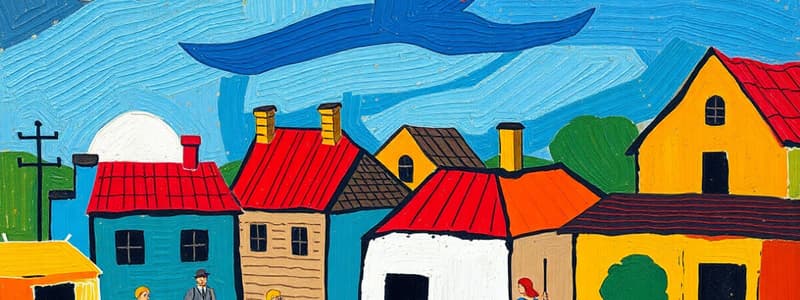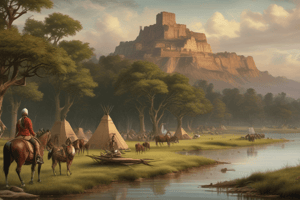Podcast
Questions and Answers
The Spanish explorer who led the conquest of the Aztec Empire in 1519 was _______.
The Spanish explorer who led the conquest of the Aztec Empire in 1519 was _______.
Hernán Cortés
The Incan Empire was conquered by the Spanish conquistador _______ in 1532.
The Incan Empire was conquered by the Spanish conquistador _______ in 1532.
Francisco Pizarro
The first permanent European settlement in what is now the United States was _______, founded by the Spanish in 1565.
The first permanent European settlement in what is now the United States was _______, founded by the Spanish in 1565.
St. Augustine, Florida
The first representative government in the English colonies, established in Virginia in 1619, was called the _______.
The first representative government in the English colonies, established in Virginia in 1619, was called the _______.
The English colony founded in 1620 by a group of Separatists seeking religious freedom was _______.
The English colony founded in 1620 by a group of Separatists seeking religious freedom was _______.
The agreement signed by the Pilgrims in 1620 to establish self-governance in their colony was the _______.
The agreement signed by the Pilgrims in 1620 to establish self-governance in their colony was the _______.
The English colony established in 1630 by Puritans seeking to build a religious community was _______.
The English colony established in 1630 by Puritans seeking to build a religious community was _______.
The Native American leader who led a rebellion against the Spanish in New Mexico in 1680 was _______.
The Native American leader who led a rebellion against the Spanish in New Mexico in 1680 was _______.
The war between Native Americans and New England settlers from 1675 to 1678 was called _______.
The war between Native Americans and New England settlers from 1675 to 1678 was called _______.
The economic policy that controlled colonial trade to benefit the mother country was called _______.
The economic policy that controlled colonial trade to benefit the mother country was called _______.
The French settlement founded by Samuel de Champlain in 1608, which became the capital of New France, was _______.
The French settlement founded by Samuel de Champlain in 1608, which became the capital of New France, was _______.
The French term for independent fur traders who lived among Native Americans was _______.
The French term for independent fur traders who lived among Native Americans was _______.
The colony of Pennsylvania was founded in 1681 by _______ as a refuge for Quakers.
The colony of Pennsylvania was founded in 1681 by _______ as a refuge for Quakers.
The English Civil War, which began in 1642, led to the execution of King _______ in 1649.
The English Civil War, which began in 1642, led to the execution of King _______ in 1649.
The English fleet took control of the Dutch colony of New Netherland in 1664 and renamed it _______.
The English fleet took control of the Dutch colony of New Netherland in 1664 and renamed it _______.
The last of the 13 English colonies, founded in 1733 as a haven for debtors, was _______.
The last of the 13 English colonies, founded in 1733 as a haven for debtors, was _______.
The agreement that granted religious toleration to all Christians in Maryland in 1649 was the _______.
The agreement that granted religious toleration to all Christians in Maryland in 1649 was the _______.
The event in 1587 in which an entire English colony disappeared without a trace is known as the _______ colony.
The event in 1587 in which an entire English colony disappeared without a trace is known as the _______ colony.
The system that granted land to settlers in Virginia, encouraging migration, was the _______ system.
The system that granted land to settlers in Virginia, encouraging migration, was the _______ system.
The war in 1588 that led to England becoming the dominant naval power and increased its ability to colonize America was the defeat of the _______.
The war in 1588 that led to England becoming the dominant naval power and increased its ability to colonize America was the defeat of the _______.
What was the main reason for the Spanish conquest of the Aztec and Incan empires?
What was the main reason for the Spanish conquest of the Aztec and Incan empires?
How did the French differ from the Spanish and English in their approach to colonization?
How did the French differ from the Spanish and English in their approach to colonization?
Why was the House of Burgesses significant in American history?
Why was the House of Burgesses significant in American history?
How did tobacco impact the survival of Jamestown?
How did tobacco impact the survival of Jamestown?
What were the main causes of King Philip's War?
What were the main causes of King Philip's War?
Why did Roger Williams and Anne Hutchinson leave Massachusetts?
Why did Roger Williams and Anne Hutchinson leave Massachusetts?
What was the significance of William Penn's “Holy Experiment" in Pennsylvania?
What was the significance of William Penn's “Holy Experiment" in Pennsylvania?
Why did England want to seize New Netherland from the Dutch?
Why did England want to seize New Netherland from the Dutch?
What was the main purpose of the Maryland Toleration Act?
What was the main purpose of the Maryland Toleration Act?
How did the defeat of the Spanish Armada in 1588 affect England's colonization efforts?
How did the defeat of the Spanish Armada in 1588 affect England's colonization efforts?
Flashcards
Hernán Cortés
Hernán Cortés
Led the Spanish conquest of the Aztec Empire in 1519.
Francisco Pizarro
Francisco Pizarro
Spanish conquistador who conquered the Incan Empire in 1532.
St. Augustine, Florida
St. Augustine, Florida
First permanent European settlement in the U.S., founded by the Spanish in 1565.
House of Burgesses
House of Burgesses
Signup and view all the flashcards
Plymouth Colony
Plymouth Colony
Signup and view all the flashcards
Mayflower Compact
Mayflower Compact
Signup and view all the flashcards
Massachusetts Bay Colony
Massachusetts Bay Colony
Signup and view all the flashcards
Popé
Popé
Signup and view all the flashcards
King Philip's War
King Philip's War
Signup and view all the flashcards
Mercantilism
Mercantilism
Signup and view all the flashcards
Quebec
Quebec
Signup and view all the flashcards
Coureurs de bois
Coureurs de bois
Signup and view all the flashcards
Pennsylvania
Pennsylvania
Signup and view all the flashcards
Charles I
Charles I
Signup and view all the flashcards
New York
New York
Signup and view all the flashcards
Georgia
Georgia
Signup and view all the flashcards
Maryland Toleration Act
Maryland Toleration Act
Signup and view all the flashcards
Lost (Roanoke) Colony
Lost (Roanoke) Colony
Signup and view all the flashcards
Headright system
Headright system
Signup and view all the flashcards
Spanish Armada
Spanish Armada
Signup and view all the flashcards
Spanish sought wealth
Spanish sought wealth
Signup and view all the flashcards
The Fur Trade
The Fur Trade
Signup and view all the flashcards
House of Burgesses
House of Burgesses
Signup and view all the flashcards
Tobacco
Tobacco
Signup and view all the flashcards
King Phillip's War Cause
King Phillip's War Cause
Signup and view all the flashcards
Roger Williams and Anne Hutchinson leave Massachusetts
Roger Williams and Anne Hutchinson leave Massachusetts
Signup and view all the flashcards
William Penn's experiment.
William Penn's experiment.
Signup and view all the flashcards
Seizing New Netherland
Seizing New Netherland
Signup and view all the flashcards
Maryland Toleration Act Purpose
Maryland Toleration Act Purpose
Signup and view all the flashcards
Defeat of the Spanish Armada
Defeat of the Spanish Armada
Signup and view all the flashcards
Study Notes
- Hernán Cortés led Spanish in the conquest of the Aztec Empire in 1519.
- Francisco Pizarro led the Spanish in conquering the Incan Empire in 1532.
- St. Augustine, Florida was the first permanent European settlement in what is now the United States, founded by the Spanish in 1565.
- House of Burgesses in Virginia, established in 1619, was the first representative government in the English colonies.
- Plymouth Colony was the English colony founded in 1620 by Separatists for religious freedom.
- Mayflower Compact was the agreement signed by the Pilgrims in 1620 to establish self-governance.
- Massachusetts Bay Colony was the English colony established in 1630 by Puritans to build a religious community.
- Popé was the Native American leader who led a rebellion against the Spanish in New Mexico in 1680.
- King Phillip's War, between Native Americans and New England settlers, occurred from 1675 to 1678.
- Mercantilism was the economic policy controlling colonial trade to benefit the mother country.
- Quebec, founded by Samuel de Champlain in 1608 became the capital of New France.
- Coureurs de bois: Term for independent French fur traders who lived among Native Americans.
- William Penn, the colony of Pennsylvania was founded in 1681 as a refuge for Quakers.
- King Charles I, whose execution in 1649 was a result of the English Civil War that began in 1642.
- New York was the name given to the Dutch colony of New Netherland after the English fleet took control in 1664.
- Georgia, founded in 1733, was the last of the 13 English colonies and served as a haven for debtors.
- Maryland Toleration Act: Agreement in 1649 that granted religious toleration to all Christians in Maryland
- Lost (Roanoke) Colony: An entire English colony disappeared without a trace in 1587.
- Headright was the system that granted land to settlers in Virginia, encouraging migration.
- Spanish Armada defeat in 1588 led to England becoming the dominant naval power and colonizing America.
- Spanish conquest of the Aztec and Incan empires was motivated by wealth and aided by advanced weaponry, alliances, and disease.
- French colonization differed by focusing on the fur trade, building alliances with Native American tribes, and avoiding large permanent settlements.
The House of Burgesses
- The first representative assembly in the American colonies, setting a precedent for self-government.
Tobacco and Jamestown
- Tobacco secured Jamestown by becoming a profitable cash crop, giving Jamestown a source of income.
King Philip's War
- Tensions over land, English expansion, and enforcement of English laws led to the war
- Roger Williams banished for advocating religious freedom and fair treatment of Native Americans.
- Anne Hutchinson expelled for challenging Puritan leaders.
William Penn's "Holy Experiment" in Pennsylvania
- It promoted religious tolerance, democracy, and peaceful relations with Native Americans.
England's seizure of the New Netherland from the Dutch
- It was to control the fur trade, connect the English colonies, and stop Dutch involvement in smuggling.
Maryland Toleration Act
- Ensured the protection of Catholic settlers and promote religious tolerance among Christians in Maryland.
The defeat of the Spanish Armada in 1588
- Weakened Spanish control of the Atlantic, allowing England to expand its naval power and establish colonies in North America.
Studying That Suits You
Use AI to generate personalized quizzes and flashcards to suit your learning preferences.




